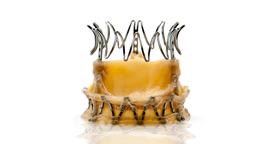September 29, 2014 — Transcatheter Technologies GmbH has announced that results of a first-in-human clinical study of its Trinity system have been published ahead of print publication in the July issue of the peer-reviewed medical journal EuroIntervention. The article is titled, “Trinity heart valve prosthesis — a novel repositionable and retrievable transapical transcatheter aortic valve system.”
Principal investigator for the
study was Christian Hengstenberg, a cardiologist at German Heart Centre, Munich. (The implantation of the device was performed in Caracas, Venezuela.) Hengstenberg’s patient was a 74-year-old female suffering from severe, symptomatic aortic stenosis. At six-month follow-up, her mean pressure gradient was reduced from 59 mmHG at the start of the study to just 22 mmHG at six months post-implantation. Equally important, there was no paravalvular leak (PVL) and no atrio-ventricular (AV) block, which would have necessitated a pacemaker implantation.
“The Trinity aortic valve is designed to be positioned precisely or even repositioned after full implantation, in a safe and simple manner,” said Hengstenberg. “In our study, Trinity’s novel sealing cuff continues to provide outstanding follow-up results without PVL, which is a frequent complication of TAVI. Equally important, the TRINITY aortic valve is designed to reduce the risk of atrio-ventricular (AV) block significantly through supra-annular positioning of the Trinity valve.”
“There are several self-expanding TAVI devices claiming repositionability during the implantation process,” said Wolfgang Goetz, M.D., Ph.D., CEO and cardiac surgeon. “The problem with these second-generation TAVI systems is that they cannot be truly repositioned once fully implanted. Trinity, on the other hand, is designed to solve this critically important issue and thereby potentially reduce the undesirable side consequences of PVL.”
“With Trinity, once our valve is completely expanded and anchored above the annulus, a cardiologist can fully evaluate the valve’s function to determine whether it needs to be repositioned, retrieved, or kept in the same position," added Goetz. "This feature and its supra-annular anchoring are absolutely unique to Trinity, which is why we have positioned Trinity as a Third-Generation TAVI System.”
For more information: www.transcatheter-technologies.com



 January 05, 2026
January 05, 2026 









